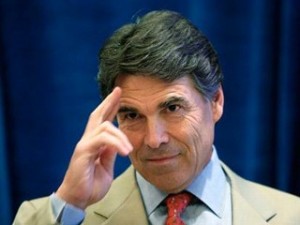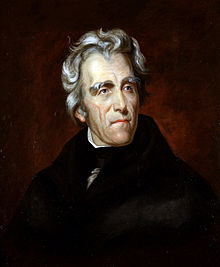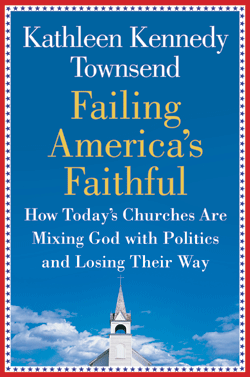 While I admire Sarah Palin for breaking ground as a woman candidate, we don’t agree on many policy issues. But her tirade in Iowa a few weeks ago against what she called “corporate crony capitalism” captured my attention. She said, “It’s not the capitalism of free men and free markets, of innovation and hard work and ethics, of sacrifice and of risk. No, this is the capitalism of connections and government bailouts and handouts and influence peddling and corporate welfare.”
While I admire Sarah Palin for breaking ground as a woman candidate, we don’t agree on many policy issues. But her tirade in Iowa a few weeks ago against what she called “corporate crony capitalism” captured my attention. She said, “It’s not the capitalism of free men and free markets, of innovation and hard work and ethics, of sacrifice and of risk. No, this is the capitalism of connections and government bailouts and handouts and influence peddling and corporate welfare.”
Good for Sarah Palin.
Naturally she singled out President Obama, but, to her credit, she also took on her own party. Republican candidates “who raise mammoth amounts of cash,” she said, should be asked what their donors “expect in return for their investments.”
 I admire Sarah Palin for speaking out loudly and forcefully against crony capitalism. It’s all too common for the rich and powerful to bend government to their own purposes and get contracts, tax and legal breaks, and other preferential treatment through their political connections. This cronyism distorts our markets and promotes distrust of Washington.
I admire Sarah Palin for speaking out loudly and forcefully against crony capitalism. It’s all too common for the rich and powerful to bend government to their own purposes and get contracts, tax and legal breaks, and other preferential treatment through their political connections. This cronyism distorts our markets and promotes distrust of Washington.
People with less money can’t get these special privileges. This at a time when the richest 1 percent already receive 25 percent of all income and control 40 percent of the country’s wealth.
In her speech, Palin blamed the president for the help he gave the auto industry and for the bank bailouts that actually occurred under George Bush. As far as the auto industry goes, I think President Obama made a gutsy call that saved thousands of jobs and one of the most important businesses in our country. Eventually the government will be paid back in full.
There are plenty of better targets: the senator who wants to change the patent laws so a law firm won’t be subject to a $200 million suit; the oil industry that reaps record profits, fouls the environment, and still gets special tax deductions; the video-game companies that have their own special deductions for no social purpose that I can tell.
 My brother Bobby Kennedy is an environmental attorney for the National Resources Defense Council, co-host of the nationally syndicated talk radio program “Ring of Fire,” and founder of the Waterkeeper Alliance, which protects waterways all over the world. For the last decade, he has spoken eloquently about the great cost of crony capitalism to the environment. When polluters don’t have to pay the full cost of their pollution, then we socialize costs and privatize profits. This is unfair to the businesses who do pay their full freight and to families whose children come down with asthma or a host of other sicknesses associated with dirty water and air.
My brother Bobby Kennedy is an environmental attorney for the National Resources Defense Council, co-host of the nationally syndicated talk radio program “Ring of Fire,” and founder of the Waterkeeper Alliance, which protects waterways all over the world. For the last decade, he has spoken eloquently about the great cost of crony capitalism to the environment. When polluters don’t have to pay the full cost of their pollution, then we socialize costs and privatize profits. This is unfair to the businesses who do pay their full freight and to families whose children come down with asthma or a host of other sicknesses associated with dirty water and air.
Bobby was outraged by the policies of the Bush administration that encouraged companies to spend money on lobbying rather than investing in their business. Mountaintop removal in Appalachia is a great example. For decades federal law made it illegal to fill the streams around the mountain with debris. The law was even upheld when violators were brought to court.
So what happened?
If you can’t win in court, maybe you can invest in Congress. The coal companies hired a platoon of lobbyists who succeeded in redefining the meaning of the word “fill” in the Clean Water Act. The companies were now free to block the streams with their debris.
According to Bobby, “Corporations don’t want democracy, they want profit. That’s why our greatest political leaders and philosophers — Republican and Democratic — have been warning people about the corrosive power of corporations. Show me a polluter and I’ll show you a fat cat with political clout.”
The power of money to distort the political system was ratcheted up a notch last year by the Supreme Court’s Citizens United decision allowing corporations to make campaign contributions. In response, Congressional Democrats have developed proposals to ban donations by foreign-influenced and taxpayer-assisted corporations, and to impose tough new disclosure requirements on corporations that steer money to political action groups. Congressional Republicans have balked at these minimal measures.
 Corporations aren’t the only recipients of political largesse. Governor Perry is a shining example of a politician who helps his individual contributors. As reported in the Wall Street Journal, Perry overruled his own advisors and accepted $75,000 in campaign donations from David Nance between 2001 and 2006. At the same time he used government programs intended for economic development to direct millions of dollars to Nance’s companies.
Corporations aren’t the only recipients of political largesse. Governor Perry is a shining example of a politician who helps his individual contributors. As reported in the Wall Street Journal, Perry overruled his own advisors and accepted $75,000 in campaign donations from David Nance between 2001 and 2006. At the same time he used government programs intended for economic development to direct millions of dollars to Nance’s companies.
Perry’s decision to mandate the use of HPV vaccine to inoculate adolescent girls against cervical cancer also has the whiff of crony capitalism. The mandate capped a concerted lobbying effort by the pharmaceutical giant Merck, an effort headed in Austin by Perry’s former chief of staff and longtime friend, Mike Toomey. (Toomey currently chairs a pro-Perry Super PAC that hopes to raise $55 million during the primaries.) On the day he signed the executive order, Perry received a $5,000 donation from Merck’s political action committee, part of the $30,000 total he has received from Merck.
America has always known crony capitalism, but we have also had presidents with the courage to take on powerful interests. Teddy Roosevelt led the anti-trust fight. Franklin Roosevelt regulated financial firms despite being called a “traitor to his class.” John Kennedy took on the steel industry. Bill Clinton raised taxes on the wealthy.
In 1832, Andrew Jackson vetoed a bill that would have extended the charter of the Second Bank of the United States. The bank’s president, Nicholas Biddle, had been using its funds to make political contributions in order to sway legislators. In his struggle with Jackson, Biddle even risked recession by shrinking credit as a way to pressure the president. Jackson would not give in.
 In his 1832 message to Congress in which he vetoed the bank’s recharter, Jackson said, “There are no necessary evils in government. Its evils exist only in its abuses.” Sometimes, he continued, “the rich and powerful bend the acts of government to their selfish purposes” and seek “exclusive privileges to make the rich richer and the potent more powerful.” Then, he said, “the humble members of society — the farmers, mechanics, and laborers — who have neither the time nor the means of securing like favors to themselves, have a right to complain of the injustice of their Government.”
In his 1832 message to Congress in which he vetoed the bank’s recharter, Jackson said, “There are no necessary evils in government. Its evils exist only in its abuses.” Sometimes, he continued, “the rich and powerful bend the acts of government to their selfish purposes” and seek “exclusive privileges to make the rich richer and the potent more powerful.” Then, he said, “the humble members of society — the farmers, mechanics, and laborers — who have neither the time nor the means of securing like favors to themselves, have a right to complain of the injustice of their Government.”
Old Hickory concluded that we should “take a stand against all new grants of monopolies and exclusive privileges, against any prostitution of our Government to the advancement of the few at the expense of the many.”
Not to put Sarah Palin in the tradition of Andrew Jackson, the Roosevelts, and John Kennedy, but I’m glad she raised the question of crony capitalism. I look forward to hearing her proposals for legislation to restrict the power of the few. We should know what these large donors want when they give so much money. At least on this issue, the Tea Party may find that they share something with the Democrats.
(Cross-posted, with permission of the author, from Atlantic.com)










Leave a Reply